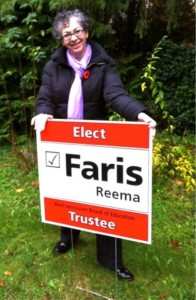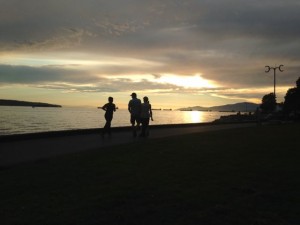Posts Tagged ‘Reema Faris’
An Announcement in Two Parts – Part 1: Not This Time
Three years ago, I put my name forward as a candidate in the 2011 municipal elections. I ran for the position of Trustee on the West Vancouver Board of Education and was honoured when voters in this community elected me to serve in that capacity.
My foray into electioneering also marked my social media debut outside the comfort zone of Facebook.
I dove into Twitter, a platform with which I’ve become very comfortable and which is now a part of how I absorb, consume, and contribute to media on a daily basis. It has also allowed me to create an invaluable network of connections.
After a long time of saying, “I would like to start a blog,” the election also spurred me to start one which I called The Comfort of Why. The best explanation for this title can be found in the speech I made at the first all-candidates’ meeting in 2011 where I said:
I take great comfort in the question why. As long as I’m asking why, I’m thinking, I’m reflecting, I’m challenging. I am looking for answers rather than assuming I have all the answers. I’m seeking information rather than dictating the way that things ought to be perceived.
To me, this questioning is not about undermining a system and disregarding the work that’s been done. It’s about validating what you believe, being responsive and strategic — making changes when they’re needed, when they’re necessary, and making them at the right time.
My first blog entry was posted on October 19, 2011, and it was comprised almost entirely of questions including this one:
Consider, too, that the BC Ministry of Education is pushing the concept of “personalized learning in the 21st century”. Why? What does it mean?
My position at the time, in regard to this particular question, was as follows:
Well, I want to be at the table to make sure that if there’s an overhaul of the system it’s done well and it’s done right. That it’s implemented in a way which benefits all students.
After three years of being at the table, I still feel this is a valid question and one that is not being addressed at a provincial level.
I still want to have this conversation. In fact, I feel we must have this conversation if we are to continue to offer our children the best opportunities to learn, to grow, and to find their way in the world.
While I recognize the valuable work that our Board has done in the past three years, in collaboration with the District Leadership Team, our education partners, our educators, and all our employees, I will not be seeking reelection in 2014.
Why?
There are a number of factors, but let me focus on three key points.
First, West Vancouver is a community with such depth of talent and with many actively engaged residents who are passionate about education. The deadline for nominations is tomorrow and already seven candidates have filed their papers which means we will have a dynamic and substantive campaign featuring a diverse range of opinions from individuals who all have much to offer.
Second, the most recent job action was very instructive and there are many lessons to be learned in how it played out. One of the most significant learning outcomes for me was to recognize that in order to move the provincial government into action on education, we need much greater direct engagement from the public. That citizens’ voice has to be galvanized if we want to ensure that education is a prominent, if not THE, election issue in 2017.
Finally, education in British Columbia has become such a polarized — and polarizing issue — that what we don’t talk about is education. This discussion — the conversation I’ve always said I wanted to see happen — has been drowned out by criticisms and accusations, by duelling press conferences and media soundbites, by job actions and political posturing.
It’s time that we, as citizens and voters, speak up and get what we want for our children, our society, and our future.
I have some ideas on how we might do just that.
Watch for Part 2.
The Speed of Life
Math was not my favourite subject in high school, but I was proficient with the material presented. Decades later a modicum of what I learned is hardwired for my general use, but don’t ask me to explain an advanced concept and please save me from anything that has to do with calculating probabilities.
One formula that has stuck with me is d = rt or distance (d) equals the rate of travel (r) multiplied by time (t). And while familiarity with the relationship between these three factors comes in handy for planning, lately I’ve been thinking about the formula’s applicability in a different way.
Why?
Because I think the distance we travel daily contributes to the feeling we have that life is hurtling by us at breakneck speeds.
On days when I teach, for example, the 25 kilometre journey to SFU’s Burnaby campus takes me about thirty minutes each way if traffic is flowing smoothly. That’s nothing compared to those who may commute in to Vancouver from the Fraser Valley or drive down each day from Squamish or ferry over from the Sunshine Coast.
Compare that to the daily distance my Grandmothers would have travelled as young women, my paternal Grandmother in rural Lebanon and my maternal Grandmother in rural Jamaica. Until they married, their circle of travel likely extended no further than 10 kilometres, by foot, over the course of a day.
We have extended the distances we travel dramatically and not just for essentials. How many consider a drive to the Bellis Fair Mall, a three-hour roundtrip from the Lower Mainland depending on border waits, a simple excursion? Or consider how cavalier we have become about booking vacations requiring hours if not days of travel?
So if the distances we traverse have become more extensive, and if you accept that our time is fixed (not just in the sense of 24 hours a day, but in the finite sense of our mortality), it would seem that the factor which has changed the most with regard to our day-to-day is r, the rate.
And that may help explain why it feels like we are living at a faster and faster rate, one which increases with each passing year.
Is it any surprise then, as we’re preparing to celebrate the arrival of the new year, that many of us wonder what happened to the old one? How is it that we are celebrating graduations when it seems like just yesterday we were celebrating the births of the children in our families?
And nothing drives home the finite nature of time as much as the loss of those around us, whether people we’ve known and loved, young and old, or strangers from far away whose images fill the news.
That’s why it’s vital to recognize, sooner rather than later, in our instantaneous 140-character world, that we do not have another now.
And unless we take control of the speed of our life, it will pass by in a blur.
Year One Retrospective
A year ago, I was elected as a Trustee to the West Vancouver Board of Education and it’s been an honour to work on behalf of this community. I’ve lived most of my life here, I’m a graduate of the school district in which I now play a role, and I’m fortunate I’m able to raise my child here.
As a public education community, we’re very lucky in West Vancouver. We have a great administrative team, we have inspiring leadership from our Superintendent, we have incredible staff, we have a caring Board, and we have a cadre of educators who are diligent, dedicated, and determined to deliver the highest quality teaching and learning.
We’re also favoured in that our community highly values education and families here generally have the means to ensure the best for their children. And yet, even with all these advantages, I see any number of troubling issues which appear to characterize the public education system in British Columbia.
And so, when I’m asked about my experience as a Trustee, my inclination is to say that the system is more complex and complicated than I realized despite having been an active parent-volunteer for five years before choosing to run for office.
Why?
In part, I think, because there are many different interpretations of the generally agreed upon underlying principle which I see as “the best interest of the child”.
Is the core purpose of education the success of the individual child or is it the betterment of society? Do parents know what’s best for their child or do teachers? Is an educator an autonomous professional or an expert member of a team?
I’m sure any one of us could generate an endless list of questions on the big picture of education, but then there are the practicalities. How is the provincial government able to show that funding per pupil is at an all time high while school districts have to nip, tuck, or cut programs and services in order to balance budgets? Given that 80% of a school district’s budget is consumed by salaries and benefits, how can innovative projects be implemented when resources are so constrained? How can infrastructure be maintained and new capital projects be contemplated with no additional funding?
Despite the seemingly intractable challenges, there’s no doubt in my mind that we have to do everything we can to foster dialogue on this issue. That education needs to be made the highest priority in this province, that we have to find a way to work collaboratively to make our strong system better.
The reason is simple. Education is the path to a more just and more equitable world.
And while it may be difficult to hold on to this truth given the evidence of the harm humans continue to do to the earth and to each other, it is why I remain committed to doing the best I can, for public education, in the remaining two years of my term.
Out And About In West Vancouver – Part Two
I filed my nomination papers on October 12, 2011, and I’m not quite sure how this happened, but five weeks have passed since then. A blink of an eye, a heartbeat, a breath.
It has been an intense five weeks: not so much because of the new challenge of running an election campaign for the first time, but because of the way the demands on my time and attention as a Mom, a candidate, an employee, a graduate student, and a volunteer seemed to escalate at the same time.
As much as I’ve enjoyed the experience, I have to admit I’m looking forward to kicking back tomorrow night, after what’s sure to be a frenetic day, to watch the results roll in once the polls have closed.
And even though tomorrow’s election day, I’ve already begun to file away lessons learned for the future. One of the most significant is that while it’s intimidating to promote yourself as a candidate, in the face of the reluctance of individuals to engage and the malaise that seems to hang over the modern electoral process, the connections you make are invaluable and essential.
I’m not just talking about the encouragement offered by friends and family or the surprising shouts of support from acquaintances, sometimes strangers. My favourite example of the latter was a woman who said to me, “I was talking to my son in Singapore today and he said to vote for Reema Faris.” I didn’t know her, I don’t know her son, but I had been recommended as a candidate in a message sent out by a supporter to acquaintances and colleagues, one of whom was the man in Singapore!
Other connections, connections which may be transitory or incidental, take on additional significance during a campaign because they resonate with meaning. I wrote about one such connection last night: the story of my conversation with a teacher for the visually-impaired who I met during a meet and greet at the Park Royal Shopping Centre last weekend.
I had a number of conversations that day, all of them meaningful in their own way. And one that sticks with me was the interaction I had with a woman who shrugged apologetically in passing, saying that she didn’t have children in the school system.

With all the activity in the days since, my recollection of the details is already hazy, but I think she did pick up a copy of my brochure and we did talk briefly.
What was so significant about this interaction?
Well, I’ve heard that assertion before: “I don’t have children in the school system”. And while that would make the election of Trustees more directly relevant to a voter, the Board serves on behalf of the entire community. So while it’s critical that you get out to vote tomorrow, please take the time to encourage everyone you know who also votes to cast their ballots, not just for Mayor and Council, but for Trustees as well whether or not they have school-age children or grandchildren. The Board of Education is theirs and they have a right to exercise their discretion in choosing candidates who will serve on their behalf effectively, efficiently, diligently, and passionately.
As I hope to do in West Vancouver.
Helping Secondary Students Contend With Post-Graduation Options
There’s an item on my to-do list that’s lingered for months: not a now thing. It’s an odd name for an action item, but consider it a secret family code.
I’ve been intrigued by the notion of jumping on board the Twitter express and of establishing a personal website as my on-line home. The website, as originally envisioned, would be a private one accessible to extended family members and close friends only. It would also be a platform for sharing my son’s artwork with those we know well. The concept intrigued him and in the evenings he’d ask, “Mama, can we do the website now?” Given that the question was often posed with five minutes to go until bedtime, my answer was, “No, it’s not a now thing.” Thus, the cryptic notation on my to-do list.
 With my decision to run as a Trustee candidate for the West Vancouver Board of Education, the not a now thing has become a done thing albeit in a different format and for a different reason. It’s a step I had wanted to take, was hesitant about taking, and then was propelled into taking as circumstances unfolded. I had to make new decisions and had to face the requirement for immediate action. A looming election date is a strong motivator!
With my decision to run as a Trustee candidate for the West Vancouver Board of Education, the not a now thing has become a done thing albeit in a different format and for a different reason. It’s a step I had wanted to take, was hesitant about taking, and then was propelled into taking as circumstances unfolded. I had to make new decisions and had to face the requirement for immediate action. A looming election date is a strong motivator!
This personal progression has made me reflect on a question that’s already popped up a number of times during the campaign. This question is often framed in the context of whether the emphasis on educating our students for a post secondary career in academics neglects opportunities for graduates who may be inclined to other avenues of study.
What a challenging question! We live in a time of straitened resources and there’s very little success to be found when organizations attempt to be “all things to all people”. There are other factors to consider, too. For example, family expectations and pressures which are private and individual to each situation. For those of us who’ve accumulated life and work experience, we also know that our paths and our destinations often change in unexpected ways.
With these and other factors in mind, what role might the school district play in accommodating different learning intentions?
It would seem to me that the answer is not to force students into career decisions too soon, but rather to offer broad horizons for them to consider and to equip them with the tools needed to consider and weigh their options. Providing the resources to investigate alternatives and enabling them to become better decision makers with regard to their own learning and course of studies. Work experience programs, summer internships, guest presentations by working professionals, in residence programs, assemblies focused on career planning, increased counseling support — I’m sure much is already being done and I think there are a myriad of other options which might also be explored.
It would be great to have the opportunity to work with our community of educators on a well-integrated range of programs and initiatives to let West Vancouver students know that while their career choices may not be a now thing, they have been well-prepared to find their own way among the many, many options available to them.

